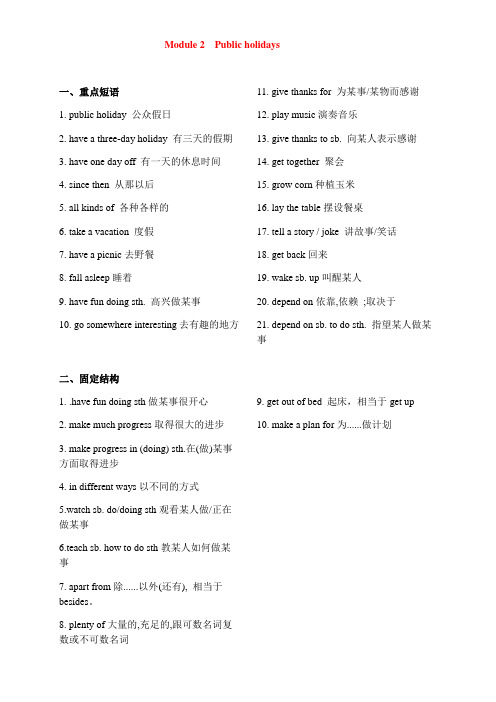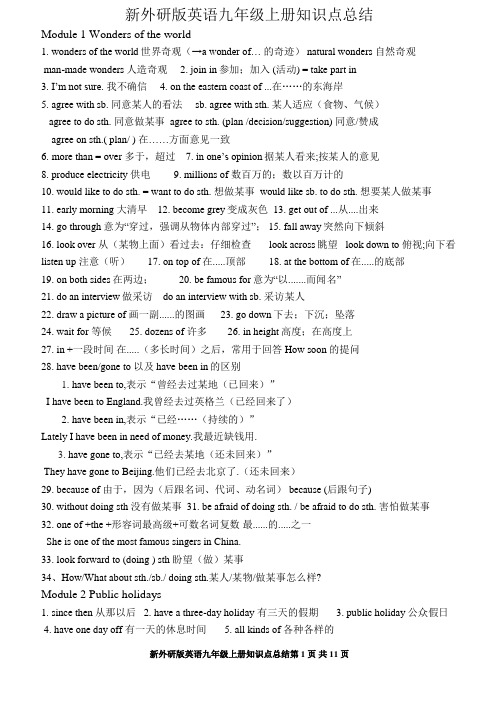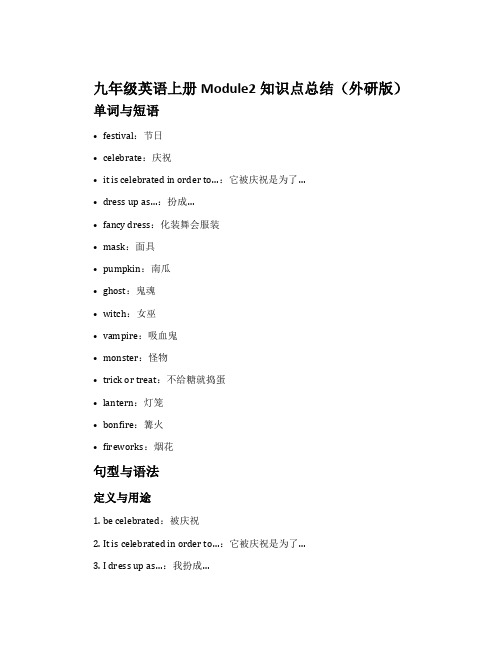外研版九年级英语上册Module2知识点总结
Module 2 Unit 1 外研版英语九年级上册知识点详解

外研版九(上)Module 2 Public holidays知识点详解Unit 1 My family always go somewhere interesting as soon as the holiday begins.★(A2).【知识点再现】The First of October is China’s National Day, isn’t it, Lingling? 玲玲,10月1日是中国的国庆节,对吗?【知识点1】the First of October 意为“十月一号”。
英语年月日的表达“在英国英语中,通常可有两种表达法。
以“1988年5月2日”为例:表达法①:写法:(the) 2 (nd) May, 1988;读法:the second of May, nineteen eighty-eight;表达法②:写法:May (the) 2 (nd), 1988;读法:May the second, nineteen eighty-eight。
如:I was born on March 6th, 1990. 我出生于1990年3 月6日。
读成:I was born on March the sixth, nineteen ninety. 或I was born on the sixth of March, nineteen ninety. 【拓展】①写法中,日期与月份之间不可加逗号;②写法中,年份前的逗号可以省略;③写法中,代表日期的序数词词尾(-st,-nd,-rd或-th)均可省略;④写法中,序数词前的定冠词the,一般可省略(尤其是以序数词开头的场合);但在读法中,该定冠词则不省略。
【知识点2】本句是反意疑问句。
在陈述句之后,附加上一个简短问句,对陈述句所述的事情提出相反的疑问,这种疑问句叫作反意疑问句。
反意疑问句由“陈述句+附加疑问句”两部分构成。
反意疑问句的结构有两种:前肯后否;前否后肯。
2022年外研版九年级上册Module 2 知识点总结

Module 2 Public holidays一、重点短语1. public holiday 公众假日2. have a three-day holiday 有三天的假期3. have one day off 有一天的休息时间4. since then 从那以后5. all kinds of 各种各样的6. take a vacation 度假7. have a picnic去野餐8. fall asleep睡着9. have fun doing sth. 高兴做某事10. go somewhere interesting去有趣的地方11. give thanks for 为某事/某物而感谢12. play music演奏音乐13. give thanks to sb. 向某人表示感谢14. get together 聚会15. grow corn种植玉米16. lay the table摆设餐桌17. tell a story / joke 讲故事/笑话18. get back回来19. wake sb. up叫醒某人20. depend on依靠,依赖;取决于21. depend on sb. to do sth. 指望某人做某事二、固定结构1. .have fun doing sth做某事很开心2. make much progress取得很大的进步3. make progress in (doing) sth.在(做)某事方面取得进步4. in different ways以不同的方式5.watch sb. do/doing sth观看某人做/正在做某事6.teach sb. how to do sth教某人如何做某事7. apart from除......以外(还有), 相当于besides。
8. plenty of大量的,充足的,跟可数名词复数或不可数名词9. get out of bed 起床,相当于get up10. make a plan for为......做计划三.重点句型:1.We only have one day off. 我们只有一天假。
新外研版英语九年级上册知识点总结

新外研版英语九年级上册知识点总结Module 1 Wonders of the world1. wonders of the world世界奇观(→a wonder of… 的奇迹) natural wonders 自然奇观man-made wonders 人造奇观 2. join in参加;加入 (活动) = take part in3. I’m not sure. 我不确信4. on the eastern coast of ...在……的东海岸5. agree with sb. 同意某人的看法 sb. agree with sth. 某人适应(食物、气候)agree to do sth. 同意做某事 agree to sth. (plan /decision/suggestion) 同意/赞成agree on sth.( plan/ ) 在……方面意见一致6.more than = over 多于,超过7. in one’s opinion据某人看来;按某人的意见8. produce electricity 供电 9. millions of 数百万的;数以百万计的10. would like to do sth. = want to do sth. 想做某事 would like sb. to do sth. 想要某人做某事11. early morning 大清早 12. become grey变成灰色 13. get out of ...从....出来14. go through 意为“穿过,强调从物体内部穿过”; 15. fall away突然向下倾斜16. look over 从(某物上面)看过去:仔细检查 look across眺望 look down to 俯视;向下看listen up 注意(听) 17. on top of 在.....顶部 18. at the bottom of在.....的底部19. on both sides在两边; 20. be famous for意为“以.......而闻名”21. do an interview做采访 do an interview with sb. 采访某人22. draw a picture of 画一副......的图画 23. go down下去;下沉;坠落24. wait for 等候 25. dozens of 许多 26. in height高度;在高度上27. in +一段时间在.....(多长时间)之后,常用于回答How soon 的提问28. have been/gone to 以及have been in的区别1. have been to,表示“曾经去过某地(已回来)”I have been to England.我曾经去过英格兰(已经回来了)2. have been in,表示“已经……(持续的)”Lately I have been in need of money.我最近缺钱用.3. have gone to,表示“已经去某地(还未回来)”They have gone to Beijing.他们已经去北京了.(还未回来)29. because of 由于,因为(后跟名词、代词、动名词) because (后跟句子)30. without doing sth 没有做某事 31. be afraid of doing sth. / be afraid to do sth. 害怕做某事32. one of +the +形容词最高级+可数名词复数最......的.....之一She is one of the most famous singers in China.33. look forward to (doing ) sth 盼望(做)某事34、How/What about sth./sb./ doing sth.某人/某物/做某事怎么样?Module 2 Public holidays1. since then 从那以后2. have a three-day holiday 有三天的假期3. public holiday 公众假日4. have one day off 有一天的休息时间5. all kinds of 各种各样的6. take a vacation /spend a vacation 度假介词短语:on / for vacationHe is going to take a vacation to Beijing. = He is going to Beijing on / for vacation.7. have a picnic去野餐 They are going to have a picnic in the park.8. have fun = have g good / great time = enjoy oneself 玩得开心;过得愉快have fun doing sth. 高兴做某事9. play music演奏音乐 10. go somewhere interesting去有趣的地方11. as soon as… 一…就… 引导时间状语从句(主将从现)I will call you as soon as I get there.13. give thanks for 为某事/某物而感谢 I gave thanks for your help.give thanks to sb. 向某人表示感谢 They gave thanks to me.14. teach sb. how to do sth. 教某人如何做某事 Tom taught me how to ride a bike.15. grow corn种植玉米 16. lay the table摆设餐桌17. tell a story / tell stories 讲故事 tell a lie 撒谎 tell a joke 讲笑话18. as well也,位于肯定句句末。
外研版英语九年级上册知识点总结

外研版英九年上册知点Module 1Wonders of the world短1.wonders of the world 世界奇natural wonders自然奇man- made wonders 人造奇2.join in 参加;加入(活 ) = take part in3.I ’ m not sure我.不确信4.agree with sb. 赞同某人的见解sb. agree with sth. 某人适(食品、天气)agree to do sth. 赞同做某事 agree to sth.(plan / decision/ suggestion) 赞同/成 agree on sth.( plan/ ) 在⋯⋯方面意一致5.on the eastern coast of ...在、、、、、、的海岸6.in one ’ s opinion据某人看来 ;按某人的意7. more than = over 多于,超8. produce electricity 供lions of 数百万的;数以百万的10.would like to do sth. = want to do sth. 想做某事Would like sb. to do sth. 想要某人做某事11. early morning大清晨12. become grey 成灰色13.get out of ...从 ....出来14.go through 意“穿,从物体内部穿”;从至尾的15.fall away 忽然向下斜16.look over 从(某物上边)看去:仔look across瞭望look down to 俯 ;向下看17. on top of 在 .....部18. at the bottom of 在 .....的底部19. on both sides在两20. be famous for 意“以 .......而名”21. do an interview 做采do an interview with sb.采某人22. draw a picture of画一副......的画23. go down 下去;下沉;落24. wait for 等候25. dozens of 多26.in height 高度;在高度上用法集萃1. agree with sb 赞同某人agree to do sth 赞同做某事2. would like to do sth 想要做某事3. in + 一段在 .....(多)以后,常用于回答How soon 的提4. have been/gone to 以及 have been in 的区5. because of+名因。
外研-九年级上册-学生版-Module2

Module 2 Public holidays【新手目标】通过本关,你能够听懂节假日方面的话题并能进行相关对话。
关卡1 Unit1 My family always go somewhere interesting as soon as the holiday begins.【过关笔记】Tony: The First of October is China's National Day, isn 't it, Lingling?Lingling: Yes. The People's Republic of China was founded on 1st October 1949. People have celebrated the National Day since then. There are flowers and national flags everywhere, and we have a threeday holiday.Tony: Do you have any plans for the holiday this year?Lingling: Yes. My parents and I are going to visit some friends in Shandong Province and will stay there until the end of the holiday. While we're staying with our friends, we're going to spend one day in Qingdao. When is your national day, Betty'?Betty : Our national day is called Independence Day. It's on 4th July. We've celebrated it since 1777. It's a public holiday, but we only have one day off. On that day, there are all kinds of holiday activities. It's the start of the vacation season and most people take a vacation sometime in July or August.Lingling: And is there anything special on that day?Betty: Well, you can see American flags everywhere. We usually have a picnic somewhere nice. Kids have great fun. We also watch bands play music in public parks.Daming: Do you have a national day in the UK, Tony?Tony: No, we don't we celebrate Christmas with a twoday holiday. And my family always go somewhere interesting as soon as the holiday begins.【成长例题】一、单项选择例题1. Look! Some people are having fun ________ in the river.A. swimB. to swimC. swimmingD. swims例题2. If you want to get on well with your classmates, you’d better not think too much aboutyourself, because a selfless(无私的)child is popular ________.A. somewhereB. everywhereC. where例题3. I hope to see you again ________ next year.A. every timeB. sometimeC. some timesD. sometimes例题4. I saw some boy students ________ basketball when I passed the playground.A. playedB. playsC. playingD. to play例题5. —Rose, have you taken a visit ________?—Yes, I visited the Giant's Causeway last month.A. anywhere fantasticB. somewhere fantasticC. fantastic somewhereD. fantastic anywhere二、用所给词的适当形式填空例题1. There are all________(kind) of flowers in the park.例题2. I live on the________(twelve) floor of the building.例题3. The mother won’t go until her son ________(e) back.例题4. As soon as they________(arrive) there, they will go to the hospital.例题5. The young man __________(live) alone since he graduated from college. 【过关练习】一、用下面方框内的词或短语的适当形式填空1. That was years ago. I’ve changed jobs __________.2. At the Spring Festival, we often __________ and eat dumplings.3. There are _________ holiday activities on Independence Day.4. —Yifan, what’s your _________ language?—Chinese. I’m proud of it.5. The new movie began _________ we arrived.二、用所给词或短语翻译句子1. 下周我将请两天假。
最新外研版英语九年级上册知识点总结(精华版)

最新外研版英语九年级上册知识点总结(精华版)邓华Module1 Wonders of the world一、重点短语1.wonders of the world世界奇观2.natural wonders自然奇观3.join in = take part in参加;加入(活动)4.agree with sb.同意某人的看法5. agree to do sth.同意做某事6.in one’s opinion依某人看来;按某人的意见7.more than = over多于,超过8. millions of数百万的;数以百万计的9.produce electricity供电10.would like to do sth. = want to do sth.想做某事11.get out of...从....出来12.become grey变成灰色13.look across眺望, 向对面看14.look down to俯视;向下看15.go down下去;下沉;坠落16.look over从(某物上面)看过去:仔细检查17. go through穿过,经历,经受,浏览18.at the bottom of在.....的底部19.on both sides在两边20.in height高度;在高度上21. do an interview with sb.采访某人22.draw a picture of画一副......的图画23.fall away突然向下倾斜24.wait for等候25.dozens of许多26.be famous for以.......而闻名二、固定结构1. sb./sth agrees with sth.某人/某物适应(食物、气候)/符合某物,I don't think the food here agrees with me. 我觉得这里的食物不对我的胃口His explanation agrees with the facts of the situation.他的解释与实情相符。
九年级英语上册Module2知识点总结(外研版)

九年级英语上册Module2知识点总结(外研版)单词与短语•festival:节日•celebrate:庆祝•it is celebrated in order to…:它被庆祝是为了…•dress up as…:扮成…•fancy dress:化装舞会服装•mask:面具•pumpkin:南瓜•ghost:鬼魂•witch:女巫•vampire:吸血鬼•monster:怪物•trick or treat:不给糖就捣蛋•lantern:灯笼•bonfire:篝火•fireworks:烟花句型与语法定义与用途1.be celebrated:被庆祝2.It is celebrated in order to…:它被庆祝是为了…3.I dress up as…:我扮成…4.There is/are…:有…5.How do people celebrate…?:人们如何庆祝…?6.What do you wear on…?:你在…时穿什么?7.We usually…:我们通常…8.have a bonfire:篝火晚会9.set off fireworks:放烟花例句与示例1.Christmas is celebrated on December 25th.(圣诞节在12月25日庆祝。
)2.It is celebrated in order to commemorate the birth of Jesus Christ.(它被庆祝是为了纪念耶稣基督的诞生。
)3.On Halloween, I dress up as a ghost.(在万圣节,我扮成鬼。
)4.There are many lanterns during the Lantern Festival.(元宵节期间有很多灯笼。
)5.How do people celebrate the Mid-Autumn Festival?(人们如何庆祝中秋节?)6.What do you wear on New Year’s Eve?(你在除夕夜穿什么?)7.We usually have a bonfire and watch fireworks on Guy Fawkes Night.(在盖伊·福克斯之夜,我们通常有篝火晚会和观看烟花。
初三英语上册Module 2 Public holidays-知识点总结-外研版

初三英语上册(外研版)Module 2 Public holidays知识点总结一、重点词汇·原文再现The People’s Republic of China was founded on 1st October 1949.中华人民共和国是在1949年10月1日成立的。
·基本用法这是英式英语日期的表达法。
在英语中常用基数词表示“年份”,“日”常用序数词读出,前面用定冠词the。
“年、月、日”的表达顺序美式英语和英式英语有区别,美式英语中,通常为“月、日、年”,英式英语中,通常为“日、月、年”。
表达“……世纪……年代”时,在表示年份的阿拉伯数字后加-s或-’s。
·原文再现It’s a public holiday, but we only have one day off.它是一个公共假日,但是我们只休息一天。
·基本用法have…off 表示“休息,不上班”,休息的时间长短通常放在have和off之间。
如:We usually have three days off on National Day.在国庆节我们通常休息三天。
·原文再现Kids have great fun.孩子们玩得都很高兴。
·基本用法have fun 意为“过得愉快;玩得高兴”。
它相当于enjoy oneself和have a good time。
如:We had a lot of fun in the park yesterday.昨天我们在公园里玩得很开心。
—We’re going to take a vacation in Hainan this year.今年我们将在海南度假。
—Have fun!祝你们玩得愉快!·知识拓展--相关句型/结构have fun in doing sth. 做某事很愉快。
如:I have fun flying kites.我享受放风筝的乐趣。
- 1、下载文档前请自行甄别文档内容的完整性,平台不提供额外的编辑、内容补充、找答案等附加服务。
- 2、"仅部分预览"的文档,不可在线预览部分如存在完整性等问题,可反馈申请退款(可完整预览的文档不适用该条件!)。
- 3、如文档侵犯您的权益,请联系客服反馈,我们会尽快为您处理(人工客服工作时间:9:00-18:30)。
Hangzhou is known for West Lake. Lao She is known as a great writer.
12. in fact= actually 事实上,实际上
9. 数百万的millions of ;hundred, thousand, million, billion 前面有具体数字用单数,与of连用用复数 100 million ;4321 billion ;thousands of works
10.例如: for example 后举一个例子 such as 后至少两个例子
13. make 做,制作;使成为 what makes a great writer?什么成就一名伟大的作家?
14. agree with sb 同意某人或某人的话;与…一致 agree to do 同意做某事
拒绝做某事refuse to do 计划做某事plan to do 想要做某事would like to do
We don’t have a magazine any more. =We have magazine no more.
6. think of 想到,想起,认为 think about 认真考虑(计划等是否可行)
What do you think of the book? = What’s your opinion of the book?
dead adj. 例如:The poor man is dead.这个可怜的人死了。
death n. 死(亡)Her death is remembered by us forever.他的过世永远铭刻在我们的心中。
dying为die的现在分词,也可作形容词,表“垂死的,濒于死亡边缘的,枯萎的”之意,She is dying.她快要死了。
17. work 工作(不可数);作品(可数且常用复数 名著 great wooks)
18. 迷路get lost ;be lost His son got lost yesterday.
19. 后缀--ed 形容词,通常用来形容人interested;excited, pleased, surprised, worried;
20. 照顾,照料 look after= take care of as…as 和…一样 as cheap as 和…一样便宜
21. 我明白了。I see.
21. 太可惜了. It’s a pity. It’s a shame. What a pity/shame!
22. 听起来像个好主意 Sounds like a good idea.
表示死的原因,die 后既可接介词 of,也可接 from, 两者的区别是:
一、若死因存在于人体之上或之内(主要指疾病、衰老等自身的原因),一般用介词 of。如:die of illness (heart trouble, cancer, a fever, etc) 死于疾病 (心脏病,癌症,发烧等)
I will think about your suggestion. 写日记keep a diary
7. 继续做另一件事go on/continue to do 继续做原来的事 go on/continue doing
8. daily 每日一次的 weekly 每周一次的 monthly 每月一次的 yearly 每年一次的
find out查找,指经过观察、探索、查询而弄清楚情况或发现某物
discover 发现,发觉,发现早已存在(还未被发现)的东西
invent发明,指发明创造以前没有的东西。
I was looking for my book at that time and at last, I found it.
We must find out the truth. Columbus discovered America.
Edison is an inventor, he invented a number of inventions.
3. get sth right 正确理解某事
4. as far as 就…来说 as far as I know/remember 据我所知/记得
5. not …any more = no more 不再…
15.run away 逃跑 put away 把…收好/放好 throw away 扔掉Biblioteka 浪费give away 分发,泄露
go away 走开 send away 解雇 far away from 远离…;离… 远 take away拿走
16. 看起来像 look like 听起来像 look like 似乎,好像 as if 即使 even though
23. finally=at last= in the end 最后,最终
at the end of 在…尽头 by the end of 到…末;截止到
Module 2 Unit 2
1. die v. 死,去世,为短暂性动词,不能与延续性时间连用,表延续性用be dead,
She has been dead for 3 years.她去世三年了。She died three years ago. 她三年前去世。
外研版九年级英语上册Module2知识点总结
Module 2 Unit 1知识点
1. 怎么了?发生了什么?What’s up? =What happened to sb?
=what’s wrong with sb? =what’s the matter with sb?
2. look for 寻找,强调找的动作;find找到,发现,强调找的结果
后缀―ing形容词,通常用来形容事物interesting, exciting, pleasing, surprising, worrying
be interested in sth;be excited at/about/by; be pleased with/ to do; be surprised at/ to do
